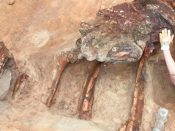Por Alice Nunes (Post-Doc Researcher: eChanges - Research Group).
Climate change models forecast an overall increase in aridity in drylands in the near future. Drier conditions are expected to increase the vulnerability of drylands to desertification and land degradation, hampering ecosystems’ functioning, and the delivery of ecosystem services. Hence, it is crucial to understand and predict the consequences of climate change for dryland ecosystems. Functional traits determine species’ responses to environment, and their influence on ecosystem processes, thus providing a mechanistic tool to monitor ecosystems’ response to climate. To understand potential impacts of climate change on Mediterranean drylands, we modelled the response of plant functional traits to climate in Holm-oak woodlands, using a spatial climatic gradient to predict changes over time. In addition, we aimed at using this trait-based information to contribute to the improvement of land management strategies and restoration tools to mitigate desertification and land degradation in these areas. We identified nine plant traits responding to aridity along space, and validated that response over time. Increasing aridity was associated to a lower functional diversity for most traits. Inter-annual climatic fluctuations greatly affected functional trait community metrics, and functional diversity showed a similar response in space and over time to climatic limitations. Multi-trait functional diversity decreased non-linearly with aridity and responded in a more predictable way to aridity than species diversity. Thus, it can be used as an indicator to map areas at risk of desertification. We also explored the relative effect of climate, topography and soil characteristics on plant communities’ functional traits. We found that topoedaphic factors largely determine shrub encroachment, suggesting that climate change will not have a strong impact on shrub encroachment in Mediterranean drylands. We discuss land management strategies to deal with shrub encroachment in light of this result. Finally, we provide a comprehensive overview of the current restoration practice in Mediterranean drylands, showing that trait-based ecology is still poorly used in practice, particularly in restoration monitoring, where it could be a useful indicator of ecosystems functional recovery. Our findings contribute to a better prediction of climate change effects on Mediterranean drylands, and to optimize land management and restoration strategies to mitigate land degradation in these areas.





















